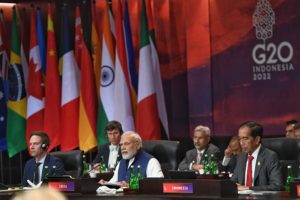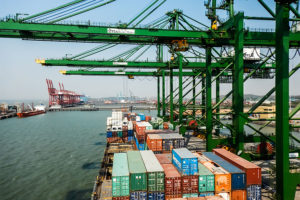Ireland is an attractive destination for growth-stage Indian startups
Tanaz Buhariwalla, Director, IDA Ireland, discusses Ireland’s key advantages as a business destination for Indian companies, including a business-friendly ecosystem, competitive costs, support for innovation and vital strategic location for companies targeting the US and EU market. She also explains why post-COVID, Indo-Ireland cooperation is more critical than ever before.

IBT: What is your view on the evolution of Indo-Ireland trade relations and key synergies for the two economies? How can relations be bolstered in the future?
Tanaz Buhariwalla: The India and Ireland relationship goes back decades. The two countries share a strong bond that started with supporting each other’s independence movement. Since becoming democracies and bringing in social reforms, the bond continued to grow stronger, starting with the education system and a strong political relationship. Over time, this led to an increase in economic and cultural activities and more recently across science and technological advancements and partnerships.
Bilateral trade stood at € 1.12 billion (CY 2019), which is the highest ever (up 25.92% YoY). These figures reaffirm our strong economic and trade ties, which are growing year on year. Major items of exports from India are chemicals, textiles, pharma, scientific equipment and rubber. India mainly imports IT devices, plastics, pharmaceuticals, scientific and medical equipment from Ireland. About 70 Indian companies have a presence in Ireland and there are about 110 Irish companies in India, with around 60 having an on-ground presence. Both numbers are rapidly rising.
There are a number of sectors where the two countries can support each other by playing off respective strengths that complement each other’s. If we look at the present pandemic, we can see evidence of mutual respect and trust between the two countries.
In April this year, PM Modi spoke to the then Irish PM, Leo Varadkar. Besides sharing their experiences on pandemic management, they discussed joint collaborations in the future in the life sciences field.
PM Varadkar commended the role played by the Indian nurses and doctors in the Irish healthcare system, through the pandemic. Irish agencies worked with the Indian Embassy in organising two special flights to bring home about 500 stranded Indians in Ireland. Local Irish agencies raised substantial money for the Indian PM CARES Fund. On their part, the Indian government permitted the export of 1,700 MT of paracetamol to Ireland by lifting the ban on export of essential medicines.
Given recent incidences, growing bilateral trade and investments, increasing numbers of students opting to study in Ireland, the increased partnerships between universities of the two countries and increased number of Irish tourists to India and vice versa, I can only see the bonds getting stronger and more deeply entrenched. The two countries see themselves as equal and trusted allies.
IBT: What impact has COVID-19 had on their bilateral trade? What areas can the two countries explore to reconstruct their economies in a mutually beneficial manner?
Tanaz Buhariwalla: COVID-19 has negatively impacted countries globally, including India and Ireland. While trade between the two countries would be hit through the lockdown period, we have also seen numerous opportunities open up.
Top sectors that have benefited include life sciences and technology. A number of Indian life sciences (medtech and pharma) and manufacturing companies supplying to Europe faced disruptions in their supply chain. These companies realise the importance of having a presence in Europe and we are in discussion with a number of them; evaluating the option of setting up a presence in Ireland. Indian companies offering digital products and even aiding in digital transformation projects for clients in the West are in discussions with my team, looking at a presence in Ireland. These companies will not be alone, but join a long list of Indian and indeed global companies that are successfully operating in Ireland.
In a post-Brexit world, Ireland remains the only English-speaking country in the EU, with an extremely supportive and pro-business government. To illustrate with an example, the Irish government offered a generous pandemic unemployment payment to those who had lost jobs, offered wage subsidies for employers and low-interest credits for micro-businesses. All these were also availed by Indian companies, professionals and students in Ireland.
A number of Irish companies exist in India including Kerry Group, Taoglas, ICON plc and Glanbia to name a few. Equally, we see a number of Irish companies looking at India in the present times. Sectors especially showing opportunities include the med tech and medical devices, SAAS, Fintech and Edtech companies. Some Irish companies are getting a lot of traction due to COVID-19 and high-end air purification company Novaerus is an example.
IBT: What are the major sectors where Ireland is looking to enhance exports to India? Conversely, what are the critical sectors where you see scope for Indian companies to enhance trade and investment with Ireland?
Tanaz Buhariwalla: IDA Ireland’s mandate is to attract FDI to Ireland. We work with companies to share information about the benefits of a presence in Ireland and also ensure that these companies continue to be successful in Ireland. We are doing this for over 70 years and Ireland’s performance as a hub for FDI is unrivaled. We work with the world’s most innovative and sophisticated companies. In addition, we believe in nurturing high-growth companies across sectors that are Ireland’s strengths and helping them forge their future success in Ireland.
Sectors thriving in Ireland include financial services, technology and internet based companies; biopharmaceuticals; medical devices, manufacturing and engineering, including the future mobility sector. Ireland is one of the most globalised countries in the world. This openness has helped it to attract investment and talent and to trade.
Ireland is home to many of the world’s leading high-performance companies including Intel, Valeo, IBM, Pfizer, Google, GM, Jaguar Land Rover, Citi, Infosys and Symantec. IDA Ireland has played a vital role in the European investment journey of many multinational companies. Indian companies with a presence in Ireland include TCS, Infosys, Wipro, Tech Mahindra, Tata Motors – Jaguar Land Rover, HCL, Wockhardt, NIIT, BrowserStack and SMT to name a few.
We have also seen an increase in Indian tech start-ups who are in growth phase setting up in Ireland. Some of them are even shifting their European headquarters to Ireland. This is not surprising, given that Ireland has fast emerged as a very conducive ecosystem for firms focused on growing their European market. Ireland has a large presence of US multinationals and this has equally proven to be a very attractive reason for Indian start-ups targeting those companies. Moreover, the geographic proximity with the US compared to other EU countries makes Ireland a hotbed for such companies.
With the UK set for a hard Brexit, Ireland has become a great option for those looking to service the EU and US and has thereby become one of the top 10 start-up ecosystems in the world. Besides, Indian start-ups find Ireland attractive because of the ease of doing business environment, low bureaucracy, the R&D tax credits, attractive corporate tax rates and low talent costs among other reasons.
IBT: Of late, the Indian government has taken quite a few initiatives (eg. land availability, Make in India, initiatives related to sectors like electronics industry, etc.) in order to promote greater FDI in manufacturing. What investment opportunities does this present for Irish companies in India?
Tanaz Buhariwalla: As mentioned, about 110 Irish companies have a presence in India and presently, there is an interest from more to explore the Indian market and set up. Kerry Group from Ireland established a state-of-the-art new manufacturing hub in Karnataka in October last year. This site will cater to Southwest Asia and MENA markets. There are other Irish companies manufacturing in India, while some others are looking at partnerships.
With the Indian govt launching the Production-Linked Incentive Scheme (PLI), some Irish companies are considering India as a manufacturing base. Irish companies can also partner with Indian companies to take benefit of programs in Make in India and Digital India.
There are many areas of opportunities for joint working in the pharmaceutical and medical devices sectors and we see a thrust in activities in these sectors, especially considering supply chain disruption in recent times.
Another area where we have seen an impetus is in R&D cooperation. The two countries should endeavour to make this an important component of our post-COVID economic recovery efforts. The Indian Embassy in Ireland is engaging with Indian professors and scientists involved in cutting-edge technologies encouraging them to share experiences with their Indian counterparts as well as aim to link industry with research. Besides the Embassies, an active role to promote opportunities and partnership in both countries is played by government and industry bodies.
IBT: What are the areas where both governments can collaborate to improve bilateral ease of doing business?
Tanaz Buhariwalla: Both countries are working with different companies, associations, chambers of commerce and other government bodies to foster collaborations and build on the existing relationships. For example, the Indian Ambassador in Ireland and his team are exploring mechanisms with the Services Export Promotion Council under the Department of Commerce, Government of India, for increasing services exports from India. The IDA engages with Indian companies, understanding their business plans for Europe and working with them on their journey to European growth through a presence in Ireland.
Enterprise Ireland is helping Irish companies find partners in India or establish a presence. CII has signed an MoU with the Irish India Business Association to help companies, especially those in the UK, and likely to be impacted by Brexit, set up a footprint in Ireland to help them access the EU markets seamlessly.
There exists a strong Double Taxation Treaty between the two countries and presently, there are talks of starting a direct flight between main cities of the two countries. This is a direct result of the increased economic, tourist and education activities between the two countries.
IBT: How do you see trade and investment shaping up for both countries over the next decade in the emerging post-COVID international scenario?
Tanaz Buhariwalla: It is natural that a number of countries may become inward looking and may wish their indigenous companies to do everything in their home country. However, we all need to be realistic. It may not be feasible to do so due to various reasons – lack of the right talent/skill-set, expertise in a specific technology, economies of scale and most importantly an ecosystem of collaborative companies and institutions.
In case of India, it has economies of scale and a large domestic market, but there are areas where it isn’t completely self-sufficient. In fact, I believe there exists a great deal of potential for synergies between countries like India and Ireland, waiting to be created. This could be achieved through collaborations amongst academic institutions, clusters of companies, industry bodies and consortia getting together, as well as companies working with IDA Ireland and Enterprise Ireland.
To illustrate, for Indian technology companies who are looking to move up the value chain by building products for the future, Ireland provides the perfect ecosystem to develop cost-effective technology solutions from the ground up at world class institutes as well as a test bed to validate these systems.
Equally, if we were to consider the life sciences sector, Ireland’s prowess is well known, with 9 of the 10 global pharma companies and 14 of the top 15 medtech companies having a large presence in Ireland across various activities. The Irish pharma sector comprises pharma, fine and speciality chemicals, as well as biotech companies and is one of the world’s largest exporters of pharma. The industry is supported by a robust R&D and education infrastructure.
Globally, supply chains were disrupted due to the COVID-19 crisis and the Indian medical device and pharma sectors were no exceptions. They were more affected due to the temporary suspension of raw materials and Class 1 medical devices from China and a ban on all healthcare products from India. It is now the endeavour of the Indian government to focus on building India’s capability in the, pharmaceuticals, bulk chemicals and healthcare sectors to reduce import dependency.
Partnerships with Irish industry, R&D centres and the education sector can help support India’s vision to be self-reliant. Equally, we see scope for, and indeed are in a number of conversations with companies, to set up a manufacturing or warehousing and distribution hub in Ireland and ensure security of supply for future times. Wockhardt, SMT, Unichem, Intas are some of the existing companies from this industry having a presence in Ireland, ranging from manufacturing to warehousing & distribution and R&D.
IBT: How does Ireland view the changing landscape of manufacturing in the coming decade with the rising prominence of Industry 4.0, especially post-COVID? How can Ireland and India collaborate to leverage this impending paradigm shift?
Tanaz Buhariwalla: Undoubtedly, the two largest mega trends we see impacting the global markets are autonomous mobility and Industry 4.0. The constantly evolving technologies of these megatrends are disrupting markets while aiding in growing new alternative markets and business models and these continue to evolve.
This pandemic has pushed companies to seriously consider Industry 4.0 and achieve automation and digitisation, while bringing efficiencies, agility and flexibility in their manufacturing processes. Presently, global economies are slowing down due to subdued consumer demand. However, the engineering sector is likely to see investments in automation to reduce human interventions and dependence; along with enhanced continuous production and reduced downtime.
Industry 4.0 continues to gain momentum with robotics, 3D printing, precision manufacturing, surface engineering and smart materials. These are areas where Ireland has expertise, with a number of indigenous and multinational companies and government-sponsored and supported research institutes working collaboratively, to not just develop these technologies, but work towards commercialising them. The government invests € 761 million in R&D annually. Strategic areas include manufacturing & materials, technology and engineering. An exceptional level of collaboration between industry, academia, state agencies and regulatory authorities drives Ireland’s dynamic R&D sector.
IDA Ireland has convened and enabled industry-led working groups in the multiple advanced manufacturing research areas, including collaborative robotics, Industry 4.0 and additive manufacturing. In Ireland, as we speak, there is focussed research carried out in most of the above-mentioned areas. Indian companies are welcome to join the research groups, while setting up in Ireland to develop their own technologies. They can prototype in Ireland by taking advantage of the developed industries there and then scale up manufacturing in India where possible.













Leave a comment